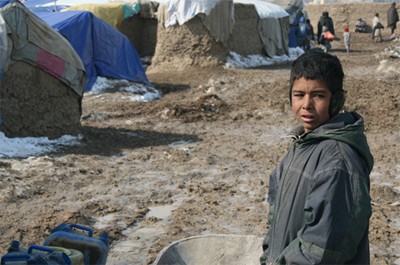IRIN, April 23, 2009
AFGHANISTAN: Sanitation woes in makeshift IDP camps
IDPs in the makeshift camps are prone to diseases like dysentery and diarrhoea because they lack access to proper sanitation, adequate safe drinking water and healthcare, health workers say
Open defecation, lack of toilets and poor sanitation in makeshift internally displaced persons (IDP) camps throughout Afghanistan are a health threat, particularly to children, health workers and aid agencies say.

Most IDPs in makeshift camps defectate in the open, which causes serious health risks. (Photo: Masoud Popalzai/IRIN)
According to the Afghan government, at least 230,000 people are living in formal IDP camps and informal settlements where few sanitary, water and toilet facilities are available.
About 500 families (2,500 individuals) displaced from southern regions have set up shacks, tents and mud huts in Qambar on the western outskirts of Kabul. Most residents there are forced to defecate in the open. Some also use insecure pit latrines or dry vault toilets near their shacks.
“In summer we suffer a lot from the stink, and the flies and mosquitoes which are attracted to the scattered faeces and dirt,” Akhtar Gul, an IDP at Qambar camp, told IRIN.
Similar concerns were raised by several residents of the Wechtangay IDP settlement in the eastern province of Nangarhar.
IDPs in the makeshift camps are prone to diseases like dysentery and diarrhoea because they lack access to proper sanitation, adequate safe drinking water and healthcare, health workers say.
The problem with building toilets…
Backed by UN agencies, the Ministry of Refugees and Returnees (MoRR) has been trying to discourage internal displacement and prevent the establishment of new IDP camps.
“Our policy is to encourage people to return to their original areas,” said Hafiz Nadeem, a MoRR official, adding that building latrines and wells in informal camps would attract more IDPs.
Anne Garella, head of the Action contre la Faim (ACF) country mission, told IRIN they had applied to build toilets and water points for the Qambar IDPs but had failed to get permission from the government.
In January the government permitted ACF to provide drinking water to the Qambar IDPs for six months; ACF has been delivering two tankers of water a day.
“The number of IDPs in the camp is increasing every day and we are very concerned about their access to drinking water after June,” said Garella, adding: “A longer-term solution would be for the government to allow us to dig wells and build toilets there.”
The need for safe drinking water will increase in the coming months and the government is expected to extend Qambar’s water delivery deadline to beyond June, according to aid workers.
Characters Count: 3115
